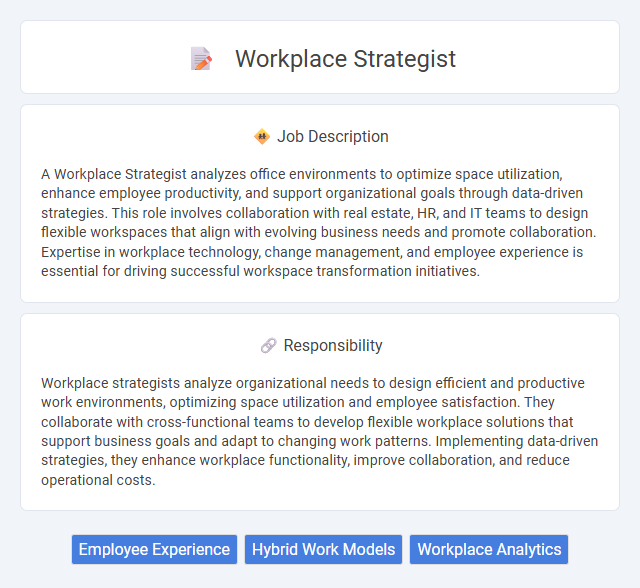
A Workplace Strategist analyzes office environments to optimize space utilization, enhance employee productivity, and support organizational goals through data-driven strategies. This role involves collaboration with real estate, HR, and IT teams to design flexible workspaces that align with evolving business needs and promote collaboration. Expertise in workplace technology, change management, and employee experience is essential for driving successful workspace transformation initiatives.
People with strong analytical skills and an interest in optimizing work environments are likely suitable for a workplace strategist role. Individuals who thrive in collaborative settings and can adapt to evolving organizational demands will probably perform well. Those uncomfortable with constant change or lacking interpersonal skills might find this job less fitting.
Qualification
A Workplace Strategist typically requires a bachelor's degree in business, architecture, interior design, or related fields, with advanced certifications in workplace analytics or change management preferred. Strong skills in space planning, data analysis, and project management are essential to optimize office environments for productivity and employee well-being. Experience with digital collaboration tools, real estate strategy, and organizational behavior enhances a candidate's effectiveness in aligning physical spaces with company goals.
Responsibility
Workplace strategists analyze organizational needs to design efficient and productive work environments, optimizing space utilization and employee satisfaction. They collaborate with cross-functional teams to develop flexible workplace solutions that support business goals and adapt to changing work patterns. Implementing data-driven strategies, they enhance workplace functionality, improve collaboration, and reduce operational costs.
Benefit
Workplace strategists likely enhance organizational efficiency by designing optimal work environments that support employee productivity and well-being. They probably contribute to cost savings through smarter space utilization and improved resource management. Their expertise may also improve collaboration and innovation within teams by aligning workplace design with company goals.
Challenge
Workplace strategists likely face the challenge of balancing innovative design solutions with organizational constraints such as budget, space limitations, and evolving employee needs. Adapting to rapidly changing work environments may demand constant reassessment of strategies to optimize productivity and employee well-being. The role probably requires effective collaboration across departments to implement sustainable and flexible workplace plans.
Career Advancement
Workplace strategists leverage space planning, employee engagement, and technology integration to optimize work environments, enhancing productivity and collaboration. Mastery of data analytics, change management, and knowledge of emerging workplace trends positions professionals for leadership roles and higher responsibility. Advancing in this career often involves gaining certifications in real estate, project management, or organizational psychology to drive strategic decisions and influence corporate culture.
Key Terms
Employee Experience
Workplace strategists enhance employee experience by designing dynamic work environments that foster collaboration, productivity, and well-being. They analyze spatial data, employee feedback, and organizational goals to create adaptable office layouts that support diverse work styles and promote engagement. Their expertise in integrating technology and ergonomic solutions ensures a seamless, comfortable, and motivating workplace for all employees.
Hybrid Work Models
Workplace strategists specializing in hybrid work models design and implement flexible office environments that balance remote and in-person collaboration, enhancing productivity and employee satisfaction. They analyze organizational needs, technology infrastructure, and employee preferences to create hybrid frameworks that support seamless communication and resource accessibility. By optimizing workspace utilization and promoting adaptable policies, these strategists help companies navigate the evolving dynamics of modern workforces.
Workplace Analytics
Workplace strategists specializing in Workplace Analytics utilize data-driven insights to optimize workspace design and enhance employee productivity. They analyze patterns in space utilization, employee movement, and collaboration trends to inform strategic decisions that improve operational efficiency and reduce costs. Leveraging advanced analytics tools, these professionals support the creation of flexible, adaptive work environments aligned with organizational goals.
 kuljobs.com
kuljobs.com